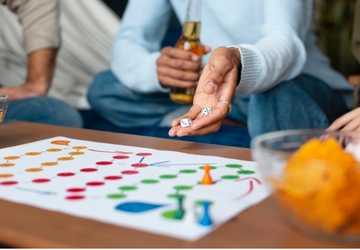When spending quality time together as a family, few things beat the joy and laughter that board games can bring. They are a blast to play, and many board games also sneakily educate while you're having fun. So, if you're looking for games that promise entertainment and learning, here's a list of the top 10 that will become family favorites.
Overview: Have you ever dreamt of a cross-country adventure? "Ticket to Ride" lets you embark on a thrilling railway journey across North America. Players compete to build train routes between cities, earning points for their tracks and destinations.
Why It's Great: This game teaches geography and strategic planning. Players will learn about major cities, states, and even lesser-known locations as they decide which routes to claim. Plus, with its colorful game board and easy-to-grasp rules, it's suitable for both younger and older family members.
Overview: Imagine an uncharted island filled with resources like wood, brick, and wheat. Your mission? To settle and become the dominant force on the island by trading, building, and strategizing.
Why It's Great: "Settlers of Catan" is all about resource management and negotiation. Players must trade smartly, plan, and adapt to changing circumstances. The game encourages critical thinking and fosters a spirit of friendly competition. Best of all, thanks to the ever-changing board setup, no two games are the same.

Overview: Dive into the world of words with "Scrabble," where players earn points by forming words on a grid using letter tiles. The longer and more complex the word, the higher the score!
Why It's Great: Aside from being fun, "Scrabble" is an excellent tool for improving vocabulary, spelling, and strategic thinking. It's a game that different age groups can enjoy, and it's always fascinating to see the unique words everyone comes up with. Plus, it's a subtle nod to the importance of language in our daily lives.
Overview: In "Codenames," two teams compete to identify their agents in a grid of words. But here's the twist: clues are given using a single word that can relate to multiple words on the board. Choose wisely, or you might just help the opposing team!
Why It's Great: This game is a communication and lateral thinking masterclass. Players must think outside the box to find clues linking multiple words. It's a fantastic way to sharpen your wit, enhance teamwork, and share many laughs.
Overview: In "Pandemic," players work together as a team of disease-fighting specialists. Your mission? To stop four deadly diseases from spreading globally while racing against time.
Why It's Great: "Pandemic" offers a cooperative gaming experience emphasizing teamwork, strategy, and decision-making. Players must collaborate closely, weighing the pros and cons of each move. It's a compelling game that fosters a sense of unity and shared purpose, making every victory all the sweeter.
Overview: Step into the medieval world of "Carcassonne," where players lay tiles to create cities, roads, and fields. By strategically placing their followers (called "meeples"), players can score points as they expand and claim features on the landscape.
Why It's Great: "Carcassonne" is a game of tactical placement and forward-thinking. Players must adapt to the ever-growing landscape, making decisions that balance immediate gains with long-term strategies. The game also teaches spatial awareness and fosters keen observation as players vie for control over key areas.
Overview: In "Forbidden Island," players work together to retrieve four ancient treasures from a sinking island. As the island floods turn by turn, players must collaborate to collect the treasures and escape before it's too late.
Why It's Great: This cooperative game emphasizes teamwork and collaboration. Players must communicate effectively, strategize together, and make collective decisions under pressure. "Forbidden Island" offers a thrilling experience that tests players' problem-solving skills and ability to work as a cohesive unit.
Overview: "7 Wonders" transports players to the ancient world, where each player is the leader of a great civilization. Over three ages, players draft cards representing buildings, wonders, and military advancements to develop their cities and earn victory points.
Why It's Great: "7 Wonders" combines strategy, resource management, and card drafting elements into a captivating gaming experience. Players must adapt their strategies based on the cards available, making each game a unique challenge.
Overview: "Qwirkle" is a tile-based game where players create lines by matching tiles based on either color or shape. Points are scored by building rows and columns that contain either all the shapes of one color or all the colors of one shape.
Why It's Great: This game is a fantastic introduction to pattern recognition and strategic planning. Players must think critically about their tile placements, anticipating future moves and potential opportunities for high-scoring plays.

Overview: "Photosynthesis" invites players to compete as different tree species grow in a vibrant forest. Players aim to earn the most points as their trees mature and cast shadows over the forest floor by strategically planting seeds, growing trees, and harnessing the sun's energy.
Why It's Great: This game beautifully combines biology and strategy. Players learn about the life cycle of trees, the importance of sunlight in photosynthesis, and the competitive dynamics of forest ecosystems. "Photosynthesis" encourages thoughtful planning and adaptability, as players must navigate the changing landscape and make strategic choices to thrive.
Board games have a magical way of bringing families together. They provide a platform for bonding, learning, and creating lasting memories. Whether you're strategizing in "Settlers of Catan" or deciphering clues in "Codenames," these games offer a blend of fun and education that's hard to beat.